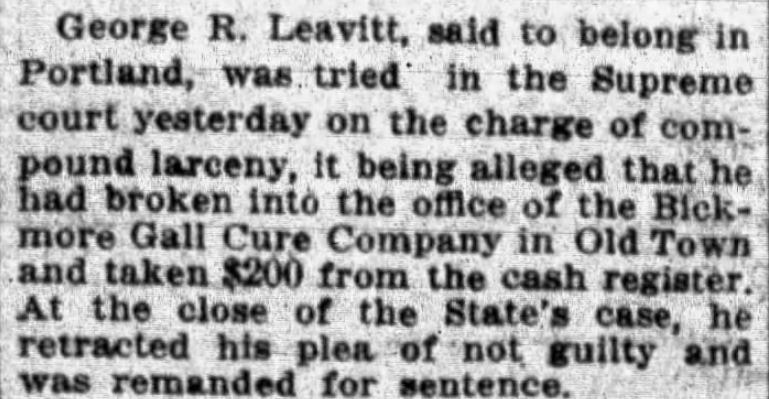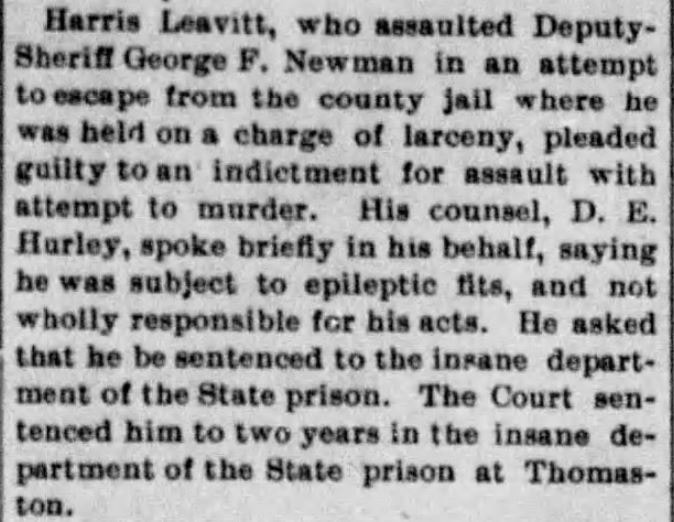|
MAINE STATE PRISONERS 1824 - 1915, from Picton Press c2001 The following nine LEAVITT (some were spelled Leavett) names are found in the book, on pages 130-131. Three of the entries belong to the same individual, though the compiler made separate lines for each (due to varying information between them). Charles Leavitt, age 19, Birthplace: Lowell; York County; burglary; committed: 10 July 1867; sentence: 2 1/2 years Unclear who this Charles may be - or if the birth place of Lowell is in Massachusetts (no Charles here in 1850, or in birth VR) or the Penobscot County, ME one (there was no Leavitt family here in 1850 census). Eliphalet Leavitt, age 31; b. New Hampshire; Penobscot County; larceny; committed: 26 Oct 1843 for 5 years Found in the Desc. of Nehemiah Leavitt v6, pg 21, he was the son of Edward and Hannah (Sias) Leavitt, and was born in Wolfeboro, NH between 1812 and 1816. He was a veteran of the Aroostook War (1839), serving two months on the northern Maine border. On 2 Sept 1841, he was arrested for larceny in Bangor [Bangor Daily Whig, 3 Sept 1841]. In March of 1843, there were reports of two men passing "bad money" in Bangor, and Eliphalet, "a familiar jail bird", was soon arrested and the Police Court sentenced him to 30 days imprisonment and a $10 fine [Bangor Daily Whig, 14 Mar 1843]. In Oct 1843, he was charged with one count of larceny and, being a third comer to court, would receive five years in the state prison. After his release, he went to live with his brother, John L., in Carmel for a time, there in 1850 census. When the Civil War broke out, Eliphalet signed up with the 12th Maine Infantry, on 16 Nov 1861, at age 44. He did not survive, dying from chronic diarrhea in New Orleans on 12 Nov 1862. He was originally buried in Cypress Grove Cem No 2, and was later reinterred in Monument Cemetery, New Orleans. George H Leavitt, age 25; b. Manchester, NH; Cumberland County; passing counterfeit money; committed: 30 Dec 1863, for 1 year According to the Supreme Judicial Court records [Vol. 4, pg 27-9], George H. Leavitt, otherwise called Harry Lane, of Windham, Maine, used a $5 counterfeit bank bill in Windham. He pled guilty of the charge, and received a year of hard labor in Thomaston. He may have been the George H "Lavett" in Naugatuck, CT, for the 1860 census, age 21, a carriage painter, b. NH. He also could have been the man of same name who, on 1 Jan 1861, enlisted into the US Army at Boston for five years (at age 23, born Manchester, NH, a painter), but deserted from Fort Delaware on 27 Mar 1861. It is not known exactly who this George H. was, or what became of him after his release from prison. George R Leavitt, age 35; prisoner #4574; b. Maine; Penobscot County; compound larceny; committed 24 Feb 1914 for "not less than 3 yrs, and not more than 5 yrs" Harris Leavitt (no age or birth); prisoner #4506; Hancock County; assault with intent to kill and murder; committed 18 Apr 1913 for 2 yrs; transferred to insane hospital on 2 May 1913. Harris, in jail on a charge of larceny, made his case much worse when he assaulted the deputy-sheriff in an attempt to escape. He was then sent to the East Maine Insane Hospital in Bangor for evaluation. While there, he and several other patients were allowed in the basement for a smoke and recreation. Harris and another man took this opportunity to make their escape, breaking out a window and running off into the woods. They voluntarily returned the following day, hungry and footsore [Ellsworth American, 26 Mar 1913]. Following his two-year sentence, he was transferred to the State Hospital in Augusta, where he remained a patient the rest of his life. He died there on 31 Mar 1942. He had been born in Calais, Maine, on 25 July 1895, the son of George and Hattie E. (Lydick) Leavitt [his father listed in Desc. of Israel Leavitt v2, pg 70]. John Leavitt, age 26; b. Hallowell; Cumberland County; larceny; committed for 5 yrs on 22 Jan 1870 In the Portland Daily Press, on 15 Jan 1870 (pg 3), the January Term of the Cumberland County Superior Court listed the following case: Looking into the case in the Superior Court Criminal Records [Vol. 1, pg 434], it gives the name of the defendant as "Edwin Clark, otherwise called John Leavitt, of Westbrook". On 12 Dec 1869, Edwin/John stole a gold watch, chain, US Treasury Notes, etc from the dwelling house of Jacob Shattuck. The 1870 census for Thomaston shows "Edwin Clarke", age 26, in the State Prison. There was a John Leavitt in Hallowell during the 1850 census, age 8, listed as born in Nova Scotia to Irish parents William and Hannah Leavitt. The family's whereabouts after this date is not known. John Leavitt (no age, birth, or county); assault and battery on jailor; sentenced 20 Dec 1879 for 5 yrs; discharged on 6 Aug 1883, served 3 yrs, 7 mos, 16 das; pardoned by Gov. Robie
John Leavitt, 19; prisoner #2455; b. Ripley; Somerset County; assault and battery of jailor; committed 9 Jan 1880 for 5 yrs John Leavitt, a. 28; prisoner #2455; b. Ripley; Somerset County; assault and battery on jailor John L. Leavitt, the son of Jonathan Jones Leavitt [Desc. of Nehemiah Leavitt v6, pg 67], was born in Ripley, Maine on 24 May 1860. In the 1870 census, he was with his parents in Ripley, age 9. In 1880, he was in Thomaston (state prison). He was pardoned by the governor and released on 6 Aug 1883, only to die 16 days later, in Gardiner on 22 Aug, aged 23 yrs.
0 Comments
Holman F. Day was a Maine native and a well known author of numerous novels and poems about Maine and its people. His writings were based on both fictional and real life Downeast characters. The following poem, published in the Lewiston Journal, was reprinted by the Boston Globe on Sunday, 31 May 1896. It reads... When Israel Leavitt Kneeled to Pray. He wore a sun-tanned, old, brown coat, His corded hands were stiff and gnurled, And every seam upon his face Spoke eloquently, where the world Had writ the toiler on his brow. - The years had held no beds of ease For this old Christian, who had fought So long and nobly on his knees. And yet, upon that gnarled old face Such gentle kindness ever glowed; Through all the wrinkles and the tan - So good the man within him showed. So patient was he with his lot Of steady toil and little gain, So quick to share his meagre store, So slow to censure or complain, That when his townsmen sought a word For perfect good a synonym, With one consent they earnestly And soulfully referred to him. - A faded, toiling, simple man, Unlettered and uncouth in speech, And yet those homely talks of his Were mightier in their humble reach Than smooth appeal and rounded phrase That rolled so unctiously down From that young college-bred divine Who held the pulpit in our town. And this I know, we impish lads, Who buzzed and nudged and acted so Each Sunday evening meeting time, Far back on dusky "Devil's row," Were prompt to stifle every laugh And cease our silly, boyish play, To bow our heads in reverence When Israel Leavitt kneeled to pray. We liked that man; he always had A sympathy for boyish woe; When youthful tribulation nagged, To Uncle Leavitt we would go; He understood a boy, you see, Although he had none of his own. And always smoothed our little griefs With kindly smile and hearty tone. Our earthly parents oft forgave Through Uncle Leavitt's kindly care, And when he knelt we dimly felt That God must likewise hear his prayer. He didn't pray as some folks pray, - He didn't proffer sage advice On managing the universe, Nor with mock meekness first entice The Gracious Father to bend down And give to him a listening ear, To then indulge in homilies On how He'd best run matters here. Ah, no! He had one simple prayer; He humbly asked that God might sift The thistles from the soul's good wheat, And give us poor, weak chaps a lift. "Jest as I, Lord, will give a lift To any neighbor when I can; I only want to get from Thee Jest what I give my fellow-man." And do you wonder when we saw That frayed, old, sun-tanned coat sink down Between the pews each Sunday night! - No graceless youngster in the town, But what would bow his tousled head, Smooth all his saucy smiles away And hide his eyes in reverence When Israel Leavitt kneeled to pray. Who was ISRAEL LEAVITT? Was he a work of fiction, or, as the poem suggests, a person from Holman's early childhood? Holman, who was born in Vassalboro, Maine in 1865, had moved with his family to Richmond, ME prior to the 1880 census. Living in town at the time of that enumeration was one Israel Leavitt, an 80-year old widower, residing in the household of his daughter Jane and her second husband, John Banks. By this time he had gone blind - the prior census did not mention that fact. The poem states that he had no sons of his own - that is true of this Israel, as he only had one daughter, Jane Thomas Leavitt.
Israel Leavitt, who was the son of Ebenezer and Sarah (Wallace) Leavitt, died on 7 March 1887, and was buried in Newell Cemetery, in the north part of town. His wife Lydia is there as well, having died decades earlier. He is found in Descendants of Israel Leavitt v2, pg 30. A grave photo can be found here: Find a Grave |
NALF NotesUpdates about our Leavitt genealogy research, our DNA projects, and other notes to keep our membership informed. Archives
September 2023
Categories
All
|



 RSS Feed
RSS Feed